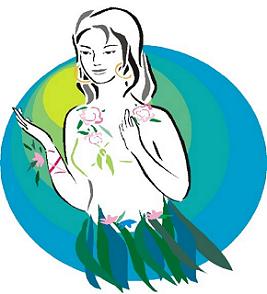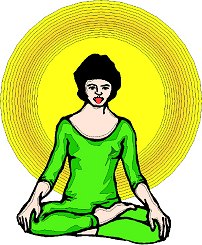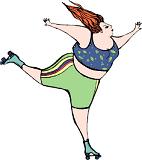Herbs that Ease Anxiety and Fear
Nettle, Oatstraw, Motherwort, and more....

c. 2002 by Susun S Weed
In the wake of the terrorist attacks (9-11), many women find that they are fearful, anxious, nervous, or depressed. In this series of articles adapted from her best-selling book New Menopausal Years the Wise Woman Way (available through www.ashtreepublishing.com, herbalist Susun S Weed shares her favorite herbs and home remedies for dealing with fear, anxiety, nervousness, grief, depression, rage, fatigue, and sleeplessness. Her Wise Woman remedies are simple and safe to use, easy to find and buy, and amazingly effective.
Fear and anxiety are closely linked, but quite different. Fear is focused, anxiety is diffuse. Fear is health promoting and protective: It keeps us from jumping off cliffs. Anxiety can destroy health and increase our vulnerability: It shortens our breath, narrows our blood vessels, and interferes with the functioning of the immune system. Fear is useful energy; it calls to our courage. Anxiety is useless; it promotes feelings of insecurity, helplessness, weakness.
Notice the difference in yourself between fear and anxiety. Whenever possible, find the fear hidden in your anxiety and let it call forth your strength and power. The following remedies can help you make this transformation.
Bach flower remedies are easy to carry and use. A dose is 1-4 drops, taken as needed. One or more of the following may ease your anxiety: Aspen (anxious about the future); Mimulus (anxious about the past); Red Chestnut (anxious about the safety of others); Elm (overwhelming anxiety); Rock Rose (anxiety that escalates into panic).
The smell of roses has been used for centuries to ease anxiety. A touch of rose essential oil on the seam of your sleeve will wrap you in calming fragrance all day. To magnify the effect, have a massage with rose-scented balms. Even one massage can cause a marked decrease in anxiety for weeks afterwards.
Yoga postures, yoga breathing, and quiet, focused meditation are excellent ways to tonify (and soothe) the sympathetic nervous system. Regular practice alleviates anxiety, often permanently. If you feel so anxious you think you might burst, try the lion pose. Open your mouth very wide; even wider! Stick your tongue out; even further. Open your eyes really wide; bigger. Rotate eyes left, then right. Breathe deeply and exhale fully up to ten times. Keep the shoulders and the forehead relaxed. This pose unblocks the throat, releases facial tension, relaxes the breathing muscles, and relieves anxiety.

Stinging nettle infusion strengthens the adrenals: relieving anxiety and building focused energy. Depleted adrenals often over-react, giving rise to sudden sensations of anxiety, fear, and nervousness. Use bulk herb, not tea bags, not capsules. Put one ounce by weight (about a cup by volume) of the dried nettle herb in a quart jar. Fill the jar to the top with boiling water and cover tightly. Let steep for at least four hours; overnight is fine. Strain herb out and drink the remaining liquid. Iced nettle infusion is particularly good. The taste is green, like spinach broth, and is better seasoned with salt than sugar or honey. Refrigerate your nettle infusion after straining it and drink it promptly as it is likely to ferment is kept for more than two days.
Oatstraw infusion is another favorite of those who want to feel less anxious. Preparation is the same as for nettle infusion; remember to avoid tea bags and capsules. The taste of oatstraw is softer and more mellow; you will enjoy it warm with a little honey. Green oat tincture is much more powerful than oatstraw infusion. It is especially useful for those whose anxiety is combined with excessive nervous energy. Or try a hot bath with lemon balm or oatstraw; an ancient remedy for bad cases of the “nerves.” Ahhhh. . . .
Motherwort tincture is my favorite calmative. It is not sleep inducing nor mind numbing. A dose of 10-20 drops can safely be taken as often as every ten minutes, if needed, to calm and soothe sore spirits. "Like sitting in my mother's lap," one satisfied user commented. Motherwort tea tastes terrible and is not very effective; likewise the capsules are not useful. Motherwort tincture can be taken every day if you wish, but you will find that you don't need it as you have used it for a while.
A dropperful of St. Joan’s/John's wort tincture is the remedy to reach for when you are on edge and feel like anything will push you over it. The dose can be repeated safely several times an hour if needed. This nerve-nourishing and nerve-strengthening herb relieves the immediate anxiety and helps prevent future distress as well.
Herbal tranquilizers are safer than prescription tranquilizers, but are best reserved for occasional use. Valerian is the best known. Because its action can be quite strong, it is best to begin with a five-drop dose, which can be repeated every 10-15 minutes until you are calm (and probably asleep). To avoid addiction, use valerian root as a tea or a tincture, not in capsules, and take it for no more than three weeks. Skullcap tincture is less addictive and often more effective. The dose is 10-20 drops of fresh plant tincture or 1-2 dropperfuls of dried plant tincture. Skullcap can also be sleep inducing, but it is rarely habituating.

Exercise is a ready remedy for overwhelming anxiety. If you feel like running away from it all, running or skating or walking briskly might be the very thing to do. Fifteen to twenty minutes of heart-pounding exercise will use up your excess adrenalin and “eat up” your stress.
Extreme fear or anxiety may lead to hyperventilation. If you are breathing rapidly and shallowly and feel spaced out you can 1) breathe into a paper bag until normal breathing resumes or 2) hold your breath (you can actually put your hand over your nose and mouth) for a count of 20; then breathe out as slowly as you can.
Calcium keeps the nerves steady. A glass of warm milk is an old wives' trusted ally for relieving anxiety. Stinging nettle is an excellent source of calcium when brewed as an infusion; one cup can contain as much as 500 mg of calcium. Oatstraw infusion is also loaded with calcium, with one cup containing up to 300 mg. Soy beverage can have the opposite effect -- that is, it may increase anxiety -- due to its ability to disrupt thyroid functioning and interfere with calcium metabolism. One herbalist who consumed large quantities of soy "milk" and soy protein bars wound up in the hospital with an irregular heartbeat and severe anxiety. If you think you are lactose intolerant, drink no more than four ounces of milk at a time, or use yogurt instead of milk. (Yogurt is generally free of lactose.)
Of course you don't want to do all these things at once! But you could join a yoga class, use nettle or oatstraw infusion daily, and have a bottle of motherwort or skullcap tincture handy for times when you are exceptionally anxious. By working with strengthening herbs and exercises, you not only relieve the bothersome symptoms but improve your overall health. That's the Wise Woman Way.
This article appeared in the December 2001edition as the first of a featured ongoing column by Susun Weed at

